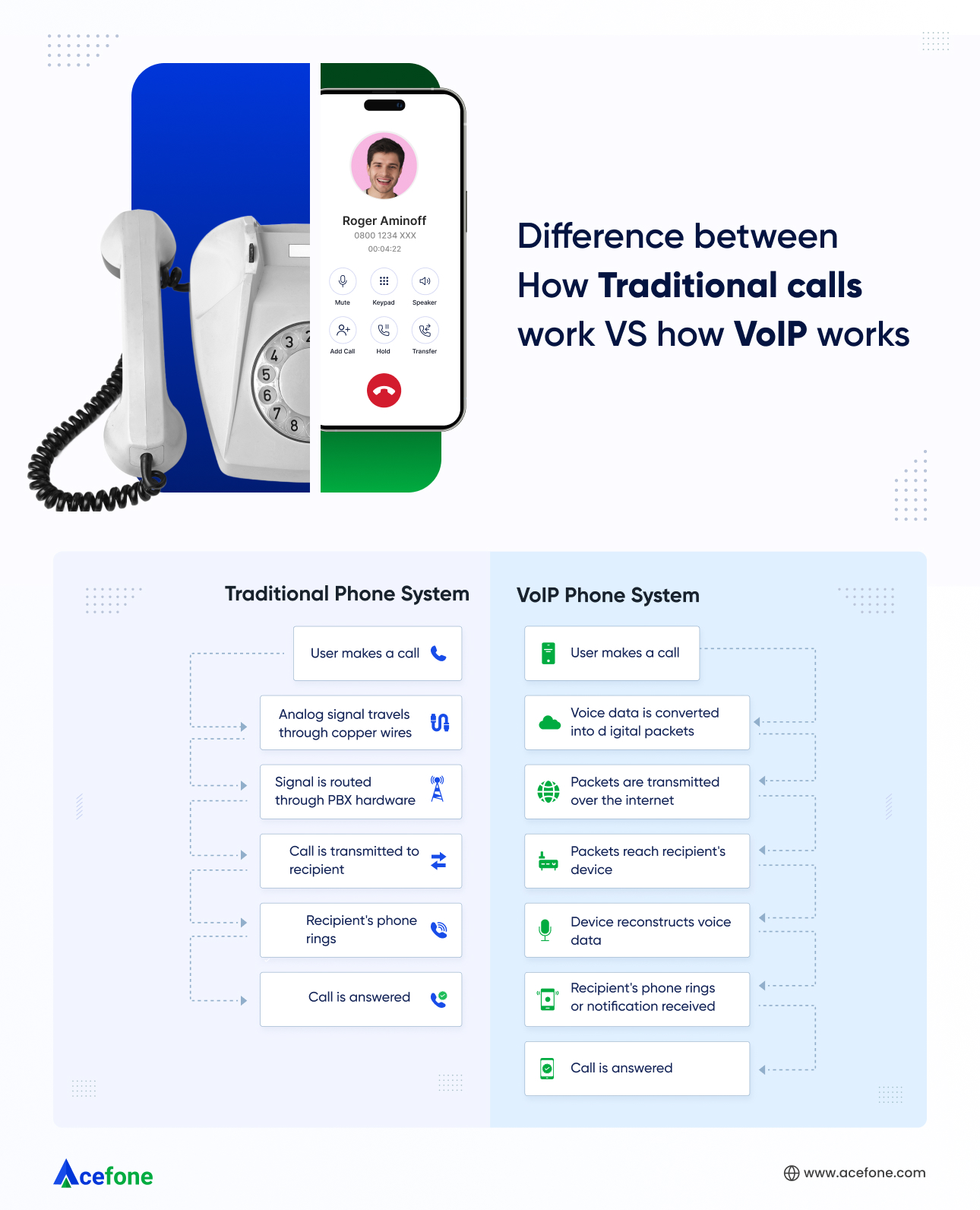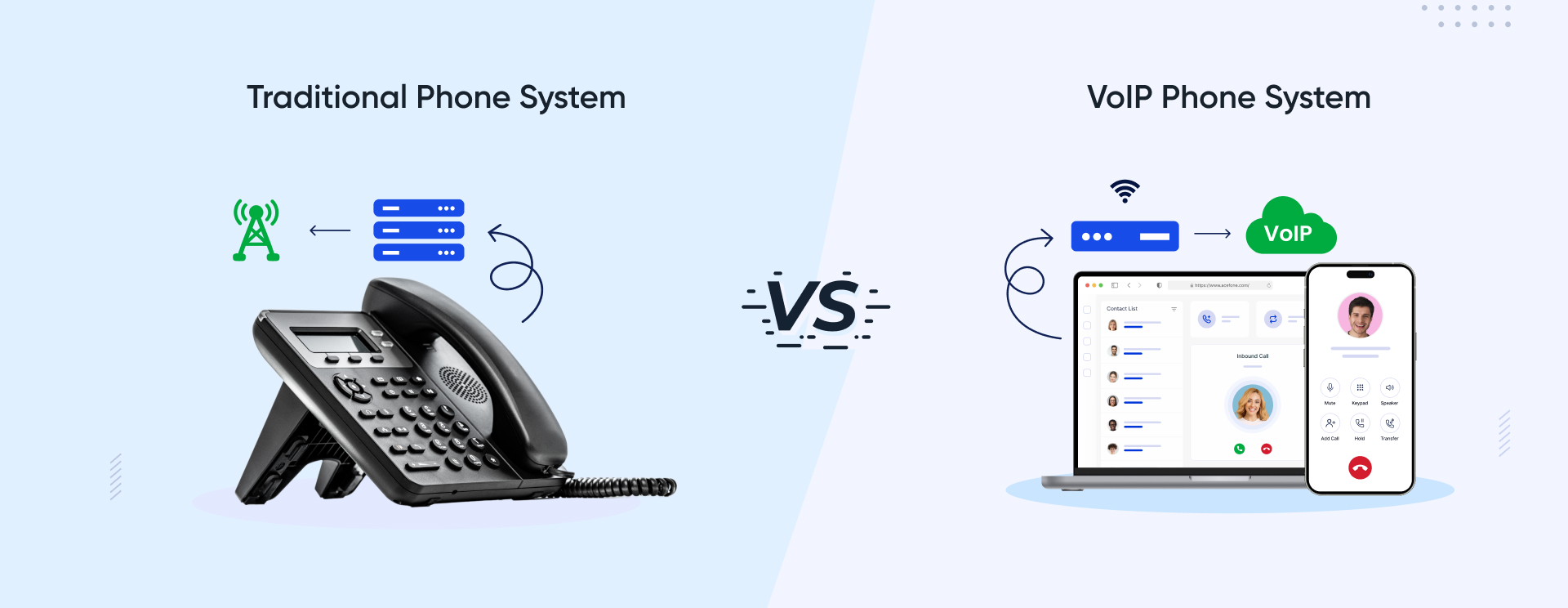With telecommunications technology soaring through the sky, enterprises need a communication system that is reliable, scalable, and cost-effective. In one hand we have traditional phone systems (landlines), which rely on analog signals and physical wiring.
On the other hand, Voice over IP (VoIP) phone systems are transforming enterprise communication by using the internet to make calls, offering several advantages over traditional calling. Here is a detailed comparison between VoIP vs Landline to help you understand which one can be the best for your business.
What is a VoIP Phone System?
A best voip systems enables voice calls over the internet instead of physical phone lines. It’s ideal for your work setup if you have employees working remotely. With Voice over IP, you get greater cost savings, flexibility, and advanced features like call forwarding and voicemail to email.
Check it out: What is a VoIP Phone System?
What are Landlines?
A landline, also known as a traditional phone system, uses physical copper wires or fiber-optic cables to transmit voice signals. These systems ensure reliable, high-quality calls with minimal latency. Traditional phone systems are ideal if you need stable communication; however, they lack the flexibility and advanced features of Voice over IP.
VoIP vs Landline: How Does Each System Work?
Hosted VoIP phone system work vastly differently from traditional phone systems. When you make a call using a VoIP, your voice is converted into long wave-like electrical signals. Once converted, the ADC chops the signals into small data packets to transmit using VoIP technology.
The Voice over IP-hosted PBX routes the data packets to the designated phone (recipient), where the data packets are converted back to your voice. The receiving VoIP phone/ regular phone rings or notifies the recipient of the incoming voice call, completing the call.
Read in-depth “ What are VoIP Phone Services ” here.
Landline phones rely on a closed network of physical phone lines to transmit voice calls from one location to another. They have been around for decades, completely unchanged, with the same features and difficulties since their launch.
With each call, a landline converts your voice into analog signals, transmitting them over underground copper wires to a Private Branch Exchange (PBX). This PBX routes the analogue signals to the recipient’s landline phone, where the earpiece converts these signals back to your voice.
Why VoIP Based Phone are suitable for Modern Enterprises?

Now that you understand how both of the phone systems work, its time to understand which works best for your business. There are several upsides and only a handful of downsides to using phone systems for modern enterprises. Here is a detailed comparison of VoIP vs landline, highlighting the important advantages of VoIP:
Cost-effective:
Voice over IP systems can be significantly less expensive than traditional phone systems. VoIP phones eliminate the need for expensive copper wiring and PBX hardware. Furthermore, the cost of transferring data across the internet is far less than transmitting signals over copper-wired lines.
Scalable:
Hosted Voice over IP is easily scalable to meet the needs of growing businesses. You can add or remove user extensions at a single click. On the contrary, traditional phone systems need to add new physical lines to add new users or vice versa.
Flexible:
VoIP business phones offer a wider range of telephony features than landlines. Features such as voicemail, auto attendants, IVR, real-time monitoring, call conferencing, call forwarding, and more. These features can improve the efficiency of your enterprise’s communications.
Mobility:
Voice over IP allows employees to make and receive calls from anywhere with an internet connection. This gives businesses with remote or mobile workforces a major upper hand over those with landlines.
Disadvantages of Landline Phone
Here are some limitations of traditional landline phone systems:
Scalability:
Adding or removing phone lines requires handling physical copper wire, which can be expensive, complex, and time-consuming.
Limited Features:
Landlines offer basic functionalities like call waiting and voicemail and lack advanced features such as video conferencing and call forwarding, available in VoIP systems.
Immobility:
Landlines are restricted to the location of their installation. The chances of you missing out on business calls while on the move are close to 100%.
Are Phone Systems Right for Your Business?
Business VoIP phone systems are a great solution for enterprises in most situations. Here are a few factors to consider before making the switch to VoIP:
Network Infrastructure:
Hosted VoIP systems require a strong and reliable internet connection to operate. Analyze your existing internet connection to ensure you get consistent connectivity for your calls. Go for business-grade internet connections to avoid call latency, call drops, jitter, and disrupted calls.
Identify Your Needs:
Make a list of the call functionalities, number of users, virtual numbers, and other features you currently need for your communication operations. Once you complete the list, begin prioritizing the ones you find most important and look for Voice over IP providers that offer the services and features you need.
Security:
Look for Voice over IP providers who offer strong data encryption and multi-layered network firewalls for their services. It is important to choose a Voice over IP provider that offers a secure system.
Costs:
Consider both upfront costs and ongoing monthly fees to see whether the VoIP phone service fits your budget or not. Check out the installation fees, license fees, maintenance fees, and other additional charges (if any).
Future Scalability:
Be sure to look for VoIP monthly plans that can accommodate the future growth of your business and evolving usage needs. Search for options like Pay-as-you-go plans and flexible contracts.
If you are considering switching to a Hosted VoIP system, be sure to do your due diligence and choose a VoIP provider that can meet your enterprise’s needs.
VoIP vs Landline: Which is the Best for Your Business?
Traditional phones have served us well, but the future of communication is undeniably moving towards a digital front. Hosted VoIP business phone system offer us a powerful concoction of cost-effective plans, scalable solutions, flexible calling, and advanced telephony features that traditional phone systems simply can’t match.
So, why wait? Leap into the future of communication and unlock the potential of Voice over IP for your enterprise.














